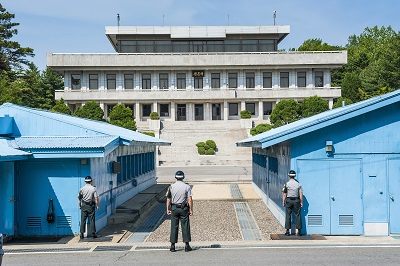U.S. President Donald Trump delivers remarks about his recent trip to Asia in the Diplomatic Room of the White House in Washington, U.S., November 15.Photo:Reuters
US President Donald Trump on Monday re-listed North Korea as a “state sponsor of terrorism,” accusing NK of “threatening the world by nuclear devastation.” It represents an unacceptable provocation from the perspective of North Korean authorities. Washington's move is likely to exacerbate tensions on the Korean Peninsula, dashing all hopes of talks.
Calling it the latest example of a hostile policy, a spokesman from the North Korean Ministry of Foreign Affairs condemned the re-listing and called additional US sanctions “a serious provocation” and “a violent infringement.” He said that North Korea would “settle all accounts with those gangsters at any time in any way,” indicating a sharper response to the US.
The Trump administration's pressure has forced North Korea into a corner, which only gives North Korea an excuse to continue its missile tests.
South Korean authorities have been trying hard to ease the tensions, as the Winter Olympic Games in Pyeongchang approaches. “Chong Wa Dae is considering suspending South Korea-US military drills during the Olympic Games,” Yonhap News reported. “It's a way of sending a message to North Korea.” The last thing the South wants to see is that Washington's provocative move increases the risk of war on the peninsula.
Opinions vary in the US. For almost two months, North Korea has refrained from testing nuclear weapons or missiles. Analysts believe that North Korean authorities have been focused on the country's economy after a series of missile tests, or they could be worried about actual US military action.
US Secretary of State Rex Tillerson stressed that “the US is not out of diplomatic options” due to the current situation. The re-listing is part of the "peaceful pressure campaign" against the North Korean regime, Tillerson explained.
Some other analysts pointed out that Trump's latest decision would make no difference to North Korea, which obviously has its own logic and cares little about sanctions.
A two-month lull in missile tests is a rational choice from North Korea after assessing the situation. Yet the latest US move has raised uncertainties. “Trump's move is the reflection of his pessimistic attitude towards the results of Song Tao's visit to North Korea,” reported South Korea's Korea Joongang Daily.
Song, a special envoy of Chinese President Xi Jinping, went on a four-day visit to Pyongyang to brief North Korea on the results of the 19th CPC National Congress amid the ongoing nuclear crisis on the Korean Peninsula. Song's trip took place less than a week after Trump’s visit to China, which had triggered speculations among the foreign media.
Although it is customary for both the CPC and Worker's Party of Korea (KWP) to send special envoys after important events, critics believe that Song's visit may have given a push to a solution to the nuclear issue on the Korean Peninsula. “(Song's visit)…likely resumed pressure on the North to curb its nuclear arms program,” the New York Times reported.
Maintaining communications with the US, South Korea as well as North Korea, China has made great efforts to ease the situation. Song's visit proves that China and North Korea have been keeping communication lines open.
One thing is for sure: Increased tensions will lead to severe consequences on the Korean Peninsula as well as to the US. War threats, including nuclear war threats, could be harmful to all parties – a scenario nobody wants to see.
(The author is a former People's Daily correspondent based in Pyongyang)

The high security border between South and North Koreas in Panmunjom. (Photo: VCG)


